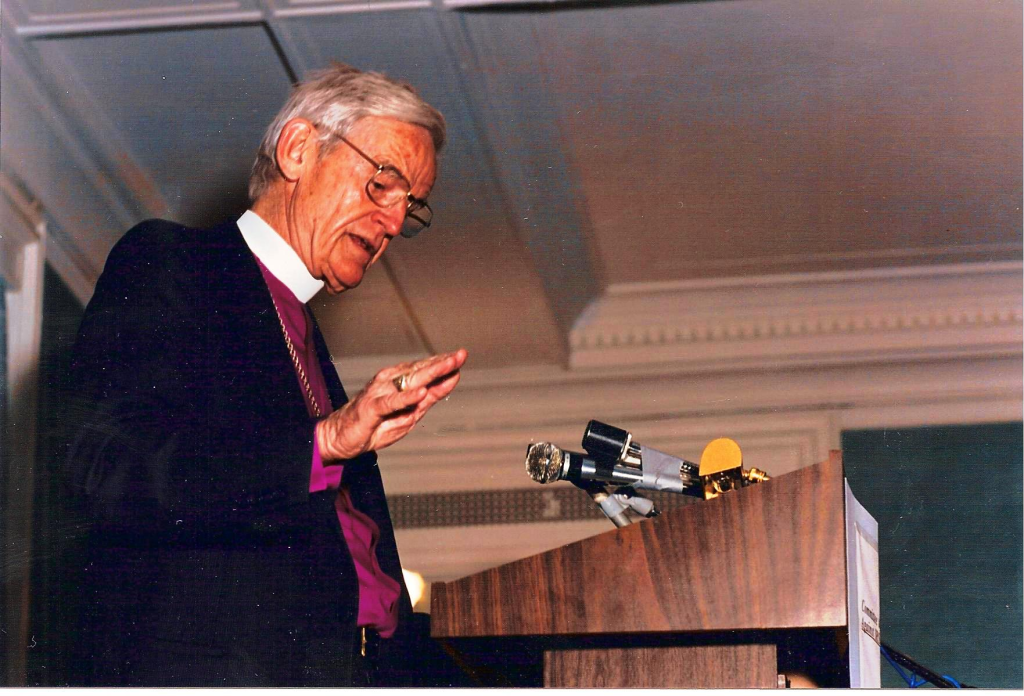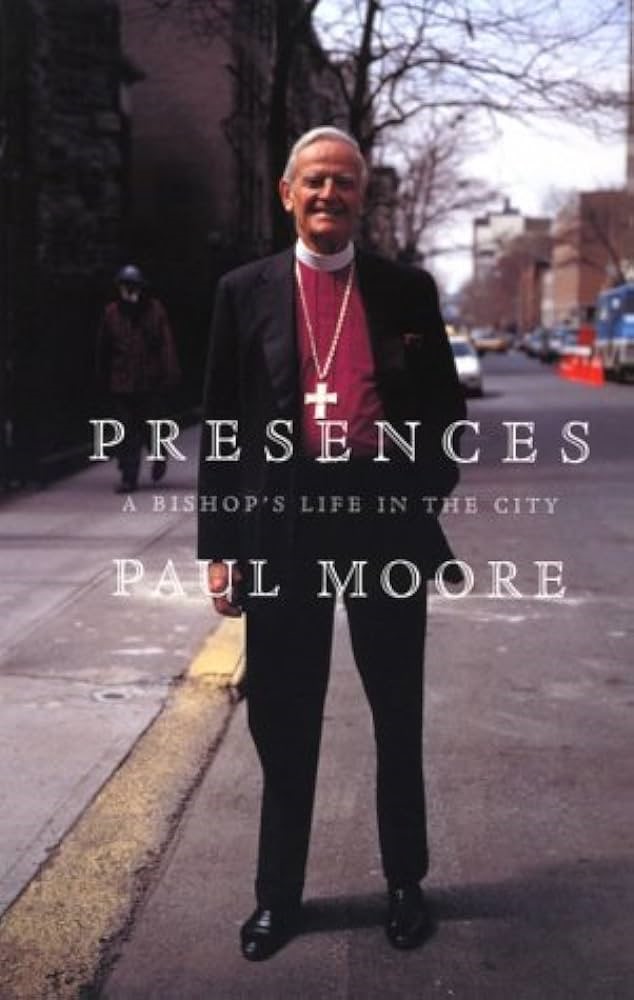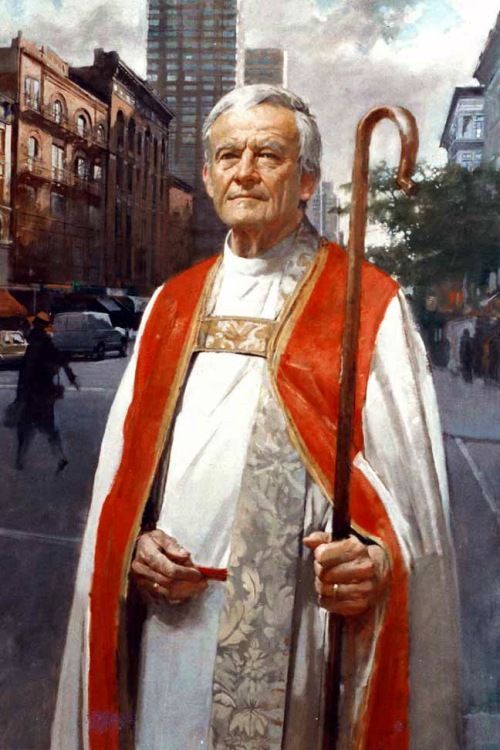
In reflecting on my own journey, I am profoundly grateful for the mentorship and friendship of Bishop Moore. His teachings and actions have greatly influenced my life, shaping my understanding of leadership, compassion, and social responsibility. The lessons I learned from him continue to guide my efforts to support young global leaders through our foundation. By following in his footsteps, we honor his legacy and work towards a world where compassion and justice prevail.
New York, N.Y. The Right Reverend Paul Moore, Jr. (1919-2003) served as the 13th Bishop of New York from 1972 to 1989. Throughout his life, Paul Moore [Luce Index™ rank: 99] stood out as perhaps the best-known Episcopal clergyman in the United States and among the most renowned Christian clergy across denominations. His unwavering commitment to social justice, inclusivity, and humanitarianism left an indelible mark on the Episcopal Church and the broader community.
Paul Moore’s leadership was characterized by his profound dedication to the Social Gospel—a movement that emphasizes the application of Christian ethics to social problems. He believed that faith should not be confined to personal spirituality but should actively address societal injustices. This belief drove him to engage deeply in various social issues, including civil rights, poverty, and LGBTQ+ rights.

In 1987, Moore joined Henry Luce III in supporting Fundamentalists Anonymous, an organization I co-founded (1985-89). Fundamentalists Anonymous aimed to assist individuals transitioning from rigid fundamentalist beliefs to a more open and inclusive spirituality. This collaboration showcased the Bishop’s willingness to support initiatives that aligned with his values of compassion and inclusivity.

Presences: A Bishop’s Life in the City
Paul Moore, Jr.. Farrar Straus Giroux
Once, when his chauffeur drove young Moore past the bread lines of Hoboken, N.J., in the family Rolls-Royce, he was “”so embarrassed… that I hid on the carpeted floor.””
But for an epilogue written in 1995, Moore’s memoir begins with his silver-spoon birth in 1919 and closes with his last sermon as Episcopal Bishop of New York in 1989.
His crowded life–in which he has somehow found time to raise nine children–has been a collision of gilded inherited values with the realities that his religious vocation presented him.
After the traditional WASP education at St. Paul’s School and Yale, and a near-fatal war wound as a Marine officer on Guadalcanal, Moore joined the clergy, bringing to it an activist social conscience.
In Manhattan, he attempted to turn the “”massive pile of stone”” of the Cathedral of St. John the Divine into a setting that went beyond liturgical uses–to suggest “”that God is in the very center of the hustle and bustle, the joys and tragedies, the filth and beauty of the everyday.””
His story, simply written, relates how he “”pushed the edge of the envelope of liberal behavior”” but stayed “”within the system.””An unusual cleric in every way, Moore suffuses his story of radicalism with an intense and deeply felt spiritual dimension.
Beyond his public role, Paul Moore was also a personal mentor and friend. Our interactions in the West Village in New York City and on Martha’s Vineyard were filled with meaningful conversations about faith, morality, and social justice. I vividly remember sharing a drink with Bishop Moore and his wife Brenda on Bank Street, discussing the implications of the Social Gospel on contemporary society. Our strolls along Lucy Vincent Beach, a place known for its natural beauty and unconventional spirit, were moments of deep reflection and dialogue.

One of the most remarkable aspects of Paul Moore’s life was his decision to give away his fortune. He used his resources to support causes that aligned with his vision of a just and compassionate society. This act of selflessness was rooted in his belief that wealth should serve the common good rather than personal gain. He often spoke about the importance of using one’s privileges to uplift the less fortunate, a lesson that has deeply influenced my own approach to life and leadership.
Although the James Jay Dudley Luce Foundation was founded after Paul’s passing, its mission to support young global leadership embodies the values he championed. The Foundation’s focus on education, humanitarianism, and global citizenship aligns perfectly with Moore’s vision of nurturing compassionate and socially responsible leaders. The Foundation provides scholarships, mentorship programs, and hands-on humanitarian projects, equipping young people with the tools and opportunities they need to become effective leaders and change-makers.
The legacy of The Right Reverend Paul Moore, Jr., continues to inspire those of us who strive to make a positive impact in the world. His dedication to social justice, compassion, and inclusivity resonates through the work of the J. Luce Foundation. By investing in young global leaders, the Foundation carries forward Moore’s vision of a better, more equitable world.
Paul Moore’s influence extends beyond his lifetime, shaping the lives of those who knew him and those who continue to be inspired by his legacy. As a thought leader and global citizen, Moore’s life exemplified the power of faith in action. His commitment to social justice and humanitarian values serves as a guiding light for all who seek to create a more compassionate and just society.
I am profoundly grateful for the mentorship and friendship of Bishop Moore
In reflecting on my own journey, I am profoundly grateful for the mentorship and friendship of Bishop Moore. His teachings and actions have greatly influenced my life, shaping my understanding of leadership, compassion, and social responsibility. The lessons I learned from him continue to guide my efforts to support young global leaders through our foundation. By following in his footsteps, we honor his legacy and work towards a world where compassion and justice prevail.
The Right Reverend Paul Moore, Jr., will forever be in my thoughts and prayers. His life and legacy serve as a testament to the power of faith, compassion, and social justice. As we strive to uplift humanity and nurture the next generation of global leaders, we carry forward the values he so passionately championed.
#PaulMooreLegacy, #SocialJustice, #CompassionateLeadership, #GlobalCitizenship, #FaithInAction, #EpiscopalChurch, #HumanitarianValues, #InspiringLeaders, #JamesLuceFoundation, #YoungGlobalLeaders, #SocialGospel, #ProgressiveFaith, #Inclusivity, #CommunityImpact, #LeadershipMentorship, #UpliftingHumanity
Epilogue: Erasing Paul’s Liberal Legacy Through Innuendo Towards Anglicanism
In 2018, the then-Bishop of New York, the far more conservative Andrew Dietsche, under the guise of the Me-Too movement, attacked Bishop Moore’s legacy. He wrote:
“Of the long-time patterns of abuse committed by my predecessor Bishop Paul Moore against priests, seminarians and laypersons in our diocese… It was observed that “there are those too powerful to be held to account,” and we were reminded that all of the sins of the world, and all of the ways in which everything and all people exist in systems marked by power differentials, and all of the ways in which people use other people to satisfy their own desires or ambitions, exist in the church as well.
“It was shattering, or difficult to comprehend, that Paul Moore, a figure of extraordinary inspiration for so many of us, also bears the epithet “Serial Predator.” Paul Moore died fifteen years ago, but for those who continue to live with the pain of his long-ago abuse, the invitation is here extended to come forward, anonymously or not, quietly or not, to give your account. You will be helped.
“That same invitation is extended to anyone in this diocese who lives with the same pain of sexual abuse or harassment to make it known. The attachment from the Me Too Committee gives some information as to how such reports may be made. You may also come to me, directly or through the Canon for Pastoral Care.
“The season of listening has come. The time when long suppressed voices may speak and be heard has come. And I am grateful to those people, mostly women, but men too — who have broken the silence in our culture. And I am grateful to those who have created the processes here described for bringing into our diocese and our convention the safe place of telling.
“May God bring peace to the abused. And may the church bring justice. And may we find in the sharing of stories and the light cast into darkness a renewed commitment in ourselves to create and nurture communities where no one must live in silent pain, and where by the grace of God and the courage of the baptized, the cultures in our church of unjust power and sexual coercion may be overcome.
I have no idea what may or may not have transpired between Paul and anyone else, but it is convenient to use ‘Me-Too’ as a weapon to attack one’s opponents. I was young, handsome, gay, and with Paul one-on-one frequently in the 1980s. Nothing even close to inappropriate ever transpired. And we cannot look back on the pre-AIDS promiscuous days of the early eighties through the lens of the 2020’s. If individuals were hurt, felt hurt, or felt hurt two decades later, I am sure Paul would have been equally hurt. I am truly sorry for those who feel victimized. But don’t applaud those “Anglican” leaders who would diminish the Social Gospel use victimology to move the church in a more conservative direction.
Tags: Paul Moore Legacy, Social Justice, Compassionate Leadership, Global Citizenship, Faith in Action, Episcopal Church, Humanitarian Values, Inspiring Leaders, James Luce Foundation, Young Global Leaders, Social Gospel, Progressive Faith, Inclusivity, Community Impact, Leadership Mentorship, Uplifting Humanity
Right Reverend Paul Moore, Jr.: Legacy of Compassion and Social Justice (May 20, 2022)